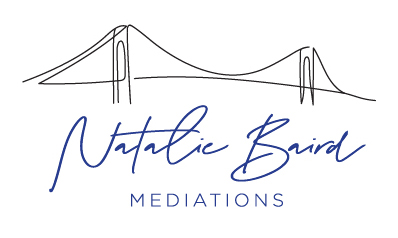Recently, we have received notice that courthouses all over the state are suspending in-person divorce mediations as well as diversion services until further notice. This is due to the recent pandemic of COVID-19. As a result, divorce mediations have ground to a halt, with the exception of Natalie Baird Mediations. Natalie has been on the cutting edge of technology by offering online, Virtual Divorce Mediation sessions. These mediations are conducted completely online, from the comfort of your own home or business. The recent shutdown and social distancing mandates do not have to affect your divorce mediation.
What is an online Virtual Divorce Mediation?
Imagine sitting down at your dining room table or quiet room where you have privacy. You open your laptop or pull out your cell phone or tablet. You use your device to connect video and audio to your Virtual Mediation room. You will be able to see and hear your mediator and negotiate from a separate virtual room than your spouse, allowing you to participate in your divorce mediation in the privacy of your own home.
It’s a new world, and new technologies have allowed Natalie Baird to use software such as Zoom, Facebook Messenger, Skype, and DocuSign, to conduct your entire divorce mediation directly from your computer. This technology allows you to not worry about driving to an office, putting on a mask, and talking face-to-face to your spouse and divorce mediator. This Virtual Mediation allows you to participate from your home in Clearwater (or any city in the world), while your spouse can participate from their home in Tampa.
How do you choose your divorce mediator in the Tampa Bay area and all over Florida
If your marriage is ending, it is very important to choose a divorce mediator that knows how to assist in an amicable divorce. Divorce can be a stressful time for you and your spouse. Natalie Baird has been a Board Certified divorce attorney since 2011 and is a Family Law Mediator certified by the Florida Supreme Court. She has mediated thousands of divorces and she can help with yours, regardless of how contentious it may be. Natalie is skilled at giving both parties time to speak, and fostering an environment of mutual respect and communication.
Natalie’s office is located in Tampa, but it doesn’t matter where you live in the state of Florida, thanks to our Virtual Mediation technology.
For more information about online divorce mediation, please fill out the form to the left or give us a call at 813-440-9975.
Who Controls the Process
Collaborative:
You and your spouse control the process and make final decision
Litigation:
Judge controls process and makes final decisions
Degree of Adversity
Collaborative:
You and your spouse pledge mutual respect and openness.
Litigation:
Court process is based on an adversarial system
Cost
Collaborative:
Costs are manageable, usually less expensive than litigation; team model is financially efficient in use of expert
Litigation:
Costs are unpredictable and can escalate rapidly including frequency of post-judgement litigation
Timetable
Collaborative:
You and your spouse create the timetable
Litigation:
Judge sets the timetable: often delays given crowded court calendar
Use of Outside Experts
Collaborative:
Jointly retained specialists provide information and guidance helping you and your spouse develop informed, mutually beneficial solution
Litigation:
Separate experts are hired to support the litigants’ positions, often at a great expense to each
Involvement of Lawyers
Collaborative:
Your lawyers work toward a mutually created settlement
Litigation:
Lawyers fight to win, but someone will lose
Privacy
Collaborative:
The process and discussion or negotiation details are kept private
Litigation:
Dispute becomes a matter of public record and sometimes media attention
Facilitation of Communication
Collaborative:
Team of collaborative practice specialists educate and assist you and your spouse on how to effectively communicate with each other
Litigation:
No process designed to facilitate communication
Voluntary vs. Mandatory
Collaborative:
Voluntary
Litigation:
Mandatory if no agreement
Lines of Communication
Collaborative:
You and your spouse communicate directly with the assistance of members of your team
Litigation:
You and your spouse negotiate through your lawyers
Court involvement
Collaborative:
Outside court
Litigation:
Court-based
